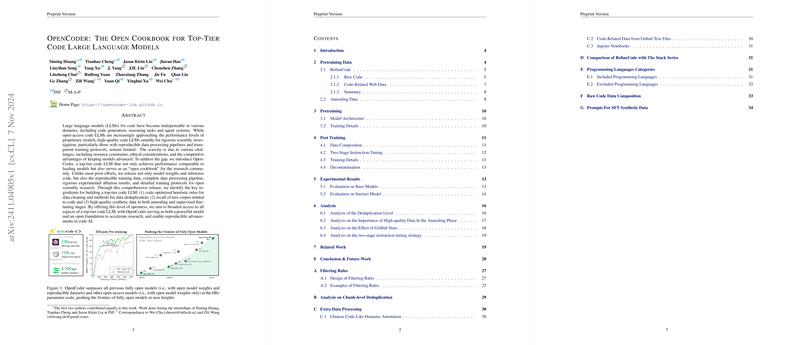OpenCoder: An Open Cookbook for Top-Tier Code LLMs
The paper "OpenCoder: The Open Cookbook for Top-Tier Code LLMs" presents the OpenCoder, a comprehensive open-source LLM designed specifically for code generation and related tasks. The authors address a significant gap in the availability of high-quality, open-access LLMs for code by releasing not only the model but also the associated training data, processing pipeline, detailed protocols, and intermediate results. This level of transparency aims to advance research in code LLMs and offers a robust foundation for future developments in code intelligence.
Key Contributions
- Open Architecture and Data: Unlike many proprietary models, OpenCoder provides open access to its model architecture, weights, and reproducible datasets. This openness is facilitated by a meticulously designed data processing pipeline that emphasizes data quality and diversity, utilizing a comprehensive set of over 130 filtering rules tailored to different programming languages. In the pretraining phase, key focuses include data cleaning, deduplication, and ensuring a rich variety of source code and related data.
- Enhanced Training Pipeline: The training of OpenCoder follows a structured approach involving several critical phases: general pretraining, an annealing stage that bridges to supervised fine-tuning (SFT), and a two-stage instruction tuning phase. This pipeline design is enriched by incorporating high-quality data and synthetic sources that enhance model capabilities beyond mere data volume.
- Evaluation and Benchmarking: The experimental results highlight OpenCoder's competitiveness, showing that it meets or exceeds the performance of several proprietary models on benchmarks such as HumanEval, MBPP, and BigCodeBench. These evaluations underline the effectiveness of the data curation and training strategies employed, particularly the significance of file-level deduplication and high-quality data in the annealing stage.
- Impact of Data Quality on Model Performance: Through extensive experiments, the paper underscores the importance of high-quality data, particularly during the annealing and instruction-tuning phases. The authors demonstrate that attention to data deduplication and cleaning significantly elevates downstream task performance.
Implications and Future Directions
OpenCoder's release marks a shift towards transparency and accessibility in the domain of code LLMs. By making high-performing models and their developmental insights open to the research community, OpenCoder not only democratizes access but also sets a precedent for reproducible research in code intelligence. The authors encourage future extensions and adaptations of OpenCoder to support a broader array of programming languages and tasks.
The introduction of a comprehensive open-source model like OpenCoder can potentially accelerate advancements by offering researchers a baseline to build upon, integrate with other systems, or further innovate in terms of architectural enhancements or data enrichment strategies.
Conclusion
The paper delivers a significant contribution to the landscape of code intelligence by offering a top-tier open-source LLM along with all necessary components to reproduce and enhance it. This confluence of transparency, performance, and community engagement embodies a notable stride towards collaborative progress in AI-driven software development tools. The authors' commitment to openness sets a standard that could inspire further innovation and research collaborations in the sector, paving the way for more robust, efficient, and accessible LLMs in the future.
